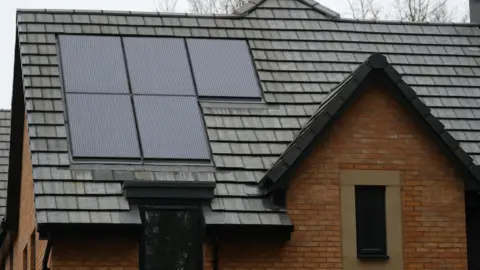In a significant announcement, Energy Secretary Ed Miliband revealed that legislation requiring solar panels on the “vast majority” of new build homes in England is slated for disclosure later this year. This policy change aims to advance the United Kingdom’s commitments toward sustainability and energy efficiency, aligning with the global climate agenda that has gained immense attention in recent years.
Miliband emphasized that the implementation of these regulations would not only significantly benefit the environment but also provide substantial financial savings for individual households. He noted that the installation of solar panels could potentially help the typical home save around £500 annually on energy expenses. The decision signifies a pivotal shift for the construction and homebuilding sectors in the UK, pushing towards greater reliance on renewable energy sources and reducing the carbon footprint of residential buildings.
The new rules are expected to be part of the upcoming Future Homes Standard, a broader legislative framework designed to improve energy efficiency alongside ambitious goals for lowering carbon emissions from residential buildings. The government has indicated that it will officially introduce these guidelines in the autumn, although there will be a transitional period allowing developers to adapt to the stricter regulations. This transition period aims to ensure that the implementation does not encounter significant disruptions in the housing market, particularly as the UK works to meet its objective of building 1.5 million new homes by 2029.
Despite backing the initiative to incorporate more solar technology in new constructions, the Home Builders Federation articulated concerns over the potential administrative and logistical burdens that could arise. They warned that excessive paperwork could hinder the government’s housing goals, calling for a balanced approach that does not stifle growth in the critical housing sector. The federation’s head, Neil Jefferson, conveyed that approximately two in five new homes currently feature solar panels, suggesting an industry already familiar with integrating renewable energy systems into their designs.
Miliband addressed potential criticisms concerning the economic implications of such regulations, insisting that housing prices would not see a detrimental impact as a result of the new solar panel requirements. He expressed confidence that developers would adjust without imposing significant costs on buyers. However, concerns remain over how strictly these regulations will be enforced. Stakeholders in the construction industry, including representatives from Solar Energy UK, emphasized the importance of local authorities remaining vigilant to ensure compliance while advocating for a framework that would be straightforward to enforce.
Historical context adds depth to these new regulations. Previously, the Conservative government explored policies that would have mandated solar panel installations covering around 40% of new homes’ rooftop area. Unfortunately, these proposals never materialized due to the change in government following the elections. The current Labour government has introduced plans aimed at furthering these intentions, with Miliband indicating that details about specific coverage percentages will be outlined in the forthcoming legislation.
The overall goal aligns with the UK’s ambitious target to achieve net-zero carbon emissions by 2050, a commitment established under the previous Conservative administration and sustained by Labour. Currently, residential buildings contribute roughly 20% of the country’s greenhouse gas emissions, underscoring the necessity to enhance energy performance in this sector significantly. The Climate Change Committee has underscored that achieving these targets is contingent on nearly complete decarbonization of housing stock.
Furthermore, the need for improved solar energy production in the UK has never been more pressing. Record levels of solar power generation have been reported recently, supported by favorable weather conditions. However, solar power still ranks as the sixth-largest source of electricity in the UK, trailing behind other energy sources like wind, gas, and nuclear.
In the political discourse surrounding energy policies, dissenting voices have emerged. Conservative party leader Kemi Badenoch challenged the feasibility of the net-zero objective, citing economic concerns and potential declines in living standards. Meanwhile, opposition parties like the Greens and Liberal Democrats have urged the government to accelerate the pathway to achieving these vital targets, highlighting the growing tension within UK politics regarding climate action.
As these new regulations come into focus, the intersection of energy policy, housing development, and environmental responsibility remains a critical area for public and political attention in the face of climate change challenges.



